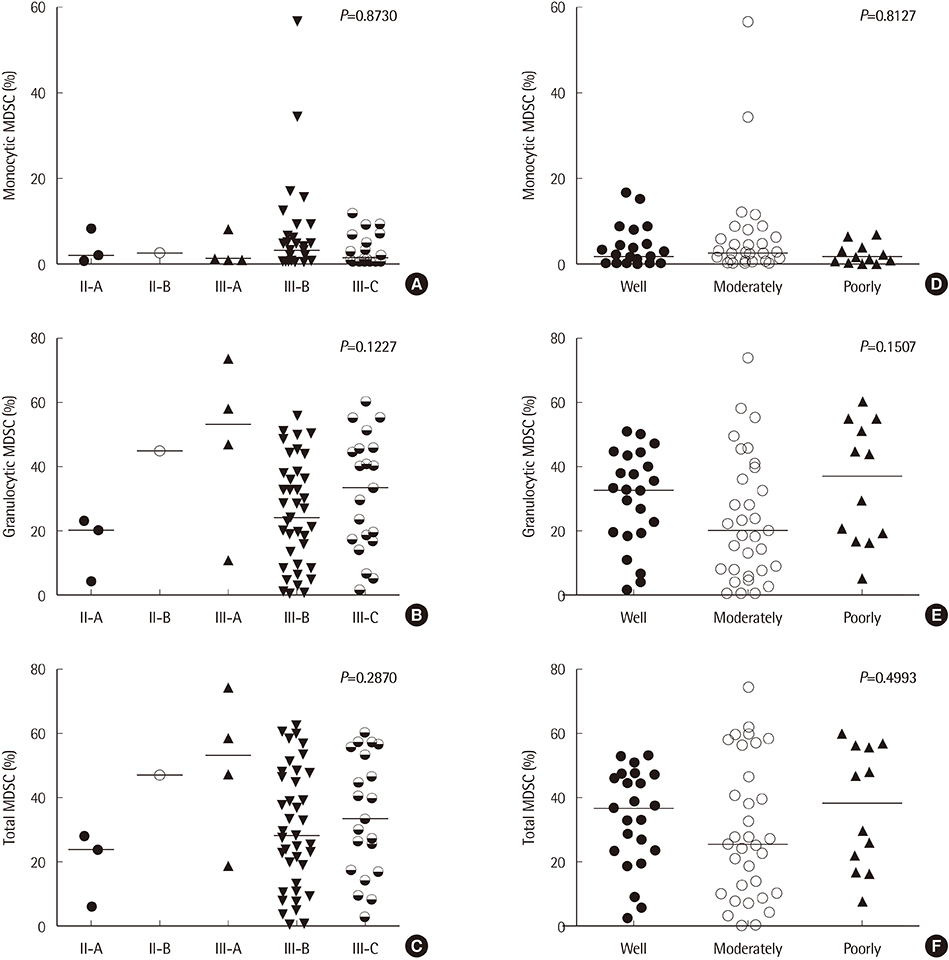Lab Med Online.
2020 Jan;10(1):75-83. 10.3343/lmo.2020.10.1.75.
Clinical Impact of Myeloid-Derived Suppressor Cells, Lymphocyte Subsets, and Neutrophil-to-Lymphocyte Ratio in Patients with Colorectal Cancer
- Affiliations
-
- 1Department of Laboratory Medicine, Chonnam National University Medical School and Chonnam National University Hwasun Hospital, Hwasun, Korea. mgshin@chonnam.ac.kr
- 2Department of Surgery, Chonnam National University Medical School and Chonnam National University Hwasun Hospital, Hwasun, Korea.
- 3Department of Laboratory Medicine, GwangYang Sarang General Hospital, GwangYang, Korea.
- 4Brain Korea 21 Plus Project, Chonnam National University Medical School, Gwangju, Korea.
- 5College of Korean Medicine, Dongshin University, Naju, Korea.
- KMID: 2466769
- DOI: http://doi.org/10.3343/lmo.2020.10.1.75
Abstract
- BACKGROUND
Preoperative myeloid-derived suppressor cells (MDSCs), neutrophil-to-lymphocyte ratio (NLR), and lymphocyte subsets have been reported to be associated with the clinical outcomes in colorectal cancer (CRC). However, studies on the clinical impact of each parameter have produced controversial results. Moreover, there is a paucity of comprehensive studies regarding these parameters in Korean CRC patients.
METHODS
Sixty-eight CRC patients who underwent surgical resection were recruited for this study. NLR was measured using an automated blood cell counter. Flow cytometric analysis was performed to determine lymphocyte subsets and identify MDSCs during the diagnostic stage. Clinical and laboratory data were analyzed according to each blood parameter.
RESULTS
The distribution of lymphocytes, MDSCs, and NLR were not associated with TNM stages. Large tumor sizes (P=0.042) and greater perineural invasion (P=0.031) were significantly associated with high CD19+ B-cell populations. Elevated granulocytic MDSCs (P=0.234), total MDSCs (P=0.234), and NLR (P=0.062) were associated with the poorly differentiated type of CRC, albeit without statistical significance. Additionally, patients in the high CD19+ B-cell group (P=0.012) revealed a moderately inferior relapse-free survival.
CONCLUSIONS
Our findings indicate that preoperative evaluation of CD19+ B-cell proportion is recommended to predict the clinical outcomes of patients with stage II-III CRC.
Keyword
Figure
Reference
-
1. Umansky V, Blattner C, Gebhardt C, Utikal J. The role of myeloid-derived suppressor cells (MDSC) in cancer progression. Vaccines (Basel). 2016; 4:E36.
Article2. Gabrilovich DI. Myeloid-derived suppressor cells as regulators of the immune system. Nat Rev Immunol. 2009; 9:162–174.
Article3. Hirbod-Mobarakeh A, Mirghorbani M, Hajiju F, Marvi M, Bashiri K, Rezaei N. Myeloid-derived suppressor cells in gastrointestinal cancers: A systematic review. J Gastroenterol Hepatol. 2016; 31:1246–1256.
Article4. Sun HL, Zhou X, Xue YF, Wang K, Shen YF, Mao JJ, et al. Increased frequency and clinical significance of myeloid-derived suppressor cells in human colorectal carcinoma. World J Gastroenterol. 2012; 18:3303–3309.5. Tada K, Kitano S, Shoji H, Nishimura T, Shimada Y, Nagashima K, et al. Pretreatment immune status correlates with progression-free survival in chemotherapy-treated metastatic colorectal cancer patients. Cancer Immunol Res. 2016; 4:592–599.
Article6. Li MX, Liu XM, Zhang XF, Zhang JF, Wang WL, Zhu Y, et al. Prognostic role of neutrophil-to-lymphocyte ratio in colorectal cancer: a systematic review and meta-analysis. Int J Cancer. 2014; 134:2403–2413.
Article7. Kubo T, Ono S, Ueno H, Shinto E, Yamamoto J, Hase K. Impact of the perioperative neutrophil-to-lymphocyte ratio on the long-term survival following an elective resection of colorectal carcinoma. Int J Colorectal Dis. 2014; 29:1091–1099.
Article8. Pine JK, Morris E, Hutchins GG, West NP, Jayne DG, Quirke P, et al. Systemic neutrophil-to-lymphocyte ratio in colorectal cancer: the relationship to patient survival, tumour biology and local lymphocytic response to tumour. Br J Cancer. 2015; 113:204–211.
Article9. Haram A, Boland MR, Kelly ME, Bolger JC, Waldron RM, Kerin MJ. The prognostic value of neutrophil-to-lymphocyte ratio in colorectal cancer: A systematic review. J Surg Oncol. 2017; 115:470–479.
Article10. Peng F, Hu D, Lin X, Chen G, Liang B, Li C, et al. The monocyte to red blood cell count ratio is a strong predictor of postoperative survival in colorectal cancer patients: The Fujian prospective investigation of cancer (FIESTA) study. J Cancer. 2017; 8:967–975.
Article11. OuYang LY, Wu XJ, Ye SB, Zhang RX, Li ZL, Liao W, et al. Tumor-induced myeloid-derived suppressor cells promote tumor progression through oxidative metabolism in human colorectal cancer. J Transl Med. 2015; 13:47.
Article12. Zhang B, Wang Z, Wu L, Zhang M, Li W, Ding J, et al. Circulating and tumor-infiltrating myeloid-derived suppressor cells in patients with colorectal carcinoma. PLoS One. 2013; 8:e57114.
Article13. Gabitass RF, Annels NE, Stocken DD, Pandha HA, Middleton GW. Elevated myeloid-derived suppressor cells in pancreatic, esophageal and gastric cancer are an independent prognostic factor and are associated with significant elevation of the Th2 cytokine interleukin-13. Cancer Immunol Immunother. 2011; 60:1419–1430.
Article14. Lindau D, Gielen P, Kroesen M, Wesseling P, Adema GJ. The immunosuppressive tumour network: myeloid-derived suppressor cells, regulatory T cells and natural killer T cells. Immunology. 2013; 138:105–115.
Article15. Zhang Y, Morgan R, Podack ER, Rosenblatt J. B cell regulation of anti-tumor immune response. Immunol Res. 2013; 57:115–124.
Article
- Full Text Links
- Actions
-
Cited
- CITED
-
- Close
- Share
- Similar articles
-
- Analysis of Lymphocyte Subsets in Peripheral Blood after Radiotherapy
- Peripheral Lymphocyte Subsets in Patients with Pulmonary and Extrapulmonary Tuberculosis
- Imbalance in T Lymphocyte Subsets in Erythema Nodosum Leprosum
- The prognostic impact of lymphocyte subsets in newly diagnosed acute myeloid leukemia
- A Study on the Changes of T Lymphocyte of the Peripheral Blood in Patients with Alopecia Areata using Flow Cytometry



